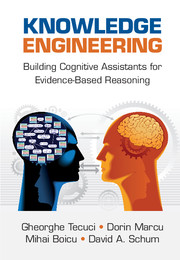 |
Knowledge Engineering: Building Cognitive Assistants for Evidence-based Reasoning |
This book presents a significant advancement in the theory and practice of knowledge engineering, the discipline concerned with the development of intelligent agents that use knowledge and reasoning to perform problem-solving and decision-making tasks. It covers the main stages in the development of a knowledge-based agent: understanding the application domain, modeling problem solving in that domain, developing the ontology, learning the reasoning rules, and testing the agent. The book focuses on a special class of agents: cognitive assistants for evidence-based reasoning that learn complex problem-solving expertise directly from human experts, support experts, and nonexperts in problem solving and decision making, and teach their problem-solving expertise to students. A powerful learning agent shell, Disciple-EBR, is included with the book, enabling students, practitioners, and researchers to develop cognitive assistants rapidly in a wide variety of domains that require evidence-based reasoning, including intelligence analysis, cybersecurity, law, forensics, medicine, and education.
Reviews and Endorsements
"At the pole opposite to statistical machine learning lies disciplined knowledge engineering. This book gives a new and comprehensive journey on the approach to AI as symbol manipulation, putting most of the relevant pieces of knowledge engineering together in a refreshingly interesting and novel way."
Edward Feigenbaum, Stanford University
"This well-written book is a much-needed update on the process of building expert systems. Gheorghe Tecuci and colleagues have developed the Disciple framework over many years and are using it here as a pedagogical tool for knowledge engineering. Hands-on exercises provide practical instruction to complement the explanations of principles, both of which make this a useful book for the classroom or self-study."
Bruce G. Buchanan, Emeritus Professor of Computer Science, University of Pittsburgh